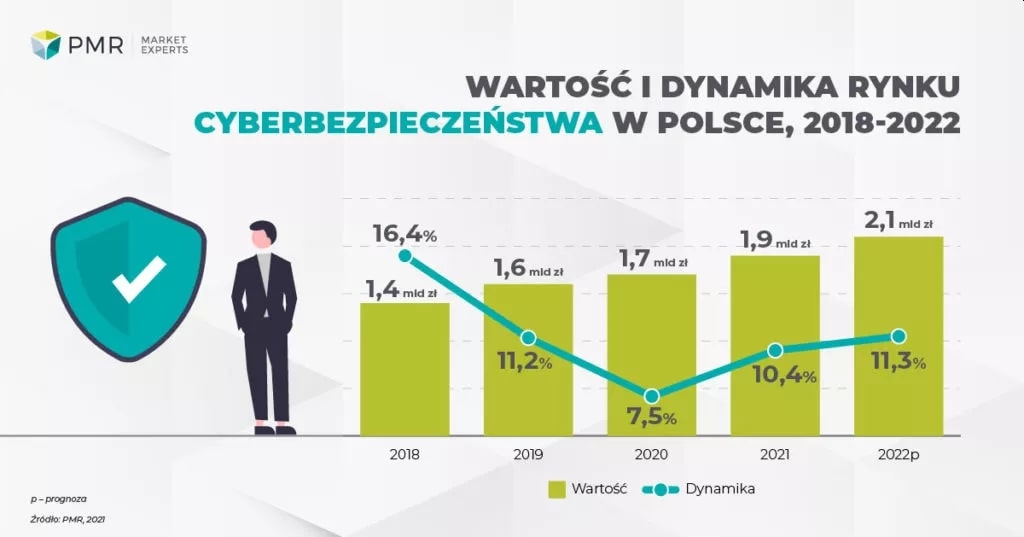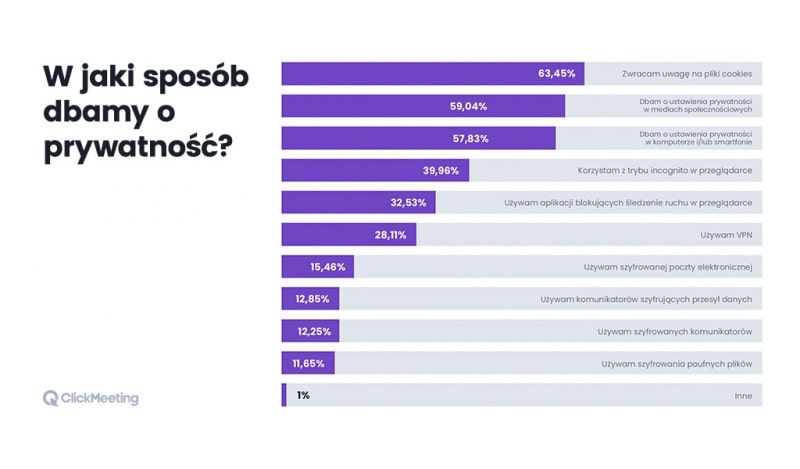 source: PMR, Cybersecurity Market in Poland 2021
source: PMR, Cybersecurity Market in Poland 2021The latest PMR report, "Cybersecurity Market in Poland 2021. Market Analysis and Development Forecasts for 2022-2026," indicates that 2021-2022 marks a return to double-digit growth in cybersecurity spending in Poland. The market value will clearly exceed PLN 2 billion next year.
The pandemic undoubtedly dominated the economic situation across the country, affecting the ICT market and its various segments, including cybersecurity. Forced digital transformation of companies - primarily through the shift to remote work - favored cloud providers, data centers, telecom operators, and VPN services.
Securing distributed corporate resources, often used in a hybrid model with remote access, became critically important. The year 2021 saw a general rebound in the market. In some areas, there were unprecedented growth rates, with customer demand sometimes limited only by supply shortages and disrupted supply chains.
Large companies remain the main consumers of IT in Poland, accounting for 58% of the total cybersecurity market value in 2021. Among industry sectors, B2B leaders include:
- banks and financial institutions,
- and the telecommunications sector,
where investments in cybersecurity are driven by the nature of their business. In the telecommunications sector, upgrades and investments in new IT systems, as well as integration of existing resources, positively impacted cybersecurity providers` revenues. In addition, in 2021, VOD providers and multimedia content services in Poland demonstrated significant spending.
More companies are considering cloud solutions and remote work in the long term, no longer viewing cybersecurity as a barrier to such changes. As cloud adoption grows, organizations are expected to rely more on IaaS solutions from major public cloud providers, potentially limiting budgets for traditional cybersecurity solutions but boosting sales to data centers and large hyperscalers. The increasing popularity of cloud-based application security solutions and offering applications as a service is expected to make these options more accessible to a broader range of organizations.
In terms of threats, the Polish market is only slightly different from global trends, mainly because Polish companies do not operate in isolation, and large organizations are often linked to foreign entities.
In the coming years, applications, services, and platforms will require careful protection, and organizations will face a growing risk of external attacks associated with the rising popularity of cloud environments, remote work, and remote access to resources.
More information is available in the PMR report: "Cybersecurity Market in Poland 2021"
Over 57% of Poles believe they care about their online privacy
Meanwhile, a survey conducted by ClickMeeting reveals that almost all respondents recognize the importance of protecting privacy during various online activities.
- 57% claim they always care about their online privacy,
- 40.6% try to, though not always,
- only 1% don’t know how to protect it and thus take no action,
- just under 1% said online privacy doesn’t matter to them.
According to data from February 2022 on internet, radio, and television consumption, 30 million people in Poland use the internet, with 25.5 million online daily. Given this, ClickMeeting decided to explore how people protect their privacy and the tools they use.
 source: ClickMeeting study
source: ClickMeeting studyThe survey shows that the largest percentage of Polish internet users pay attention to cookies (63.4%). Nearly 60% focus on privacy settings on social media, and 57.8% on privacy settings on their computer and/or smartphone. They also consider browser settings, using incognito mode (nearly 40%) or tracking-blocking applications (32.5%), and 28% use VPN services. Some also use solutions such as encrypted email (15.5%), data-encryption messaging apps (12.8%), and encrypted communicators (12.2%), with 11% using tools to encrypt confidential files.
Online events and privacy
Companies are increasingly using online solutions to conduct and promote their business. Consequently, events previously held in person have moved online. Webinars, for instance, have gained popularity, with their duration increasing by 16 minutes in 2021 compared to 2020, according to ClickMeeting.
While the primary considerations for internet users in choosing such events remain content quality and invited experts, ClickMeeting investigated how important privacy is for participants. It turns out that:
- 73.7% of respondents want webinar organizers to ensure their privacy,
- just under 20% are indifferent,
- 4.8% declared they don’t pay attention to this aspect.
- According to ClickMeeting data, nearly 20% of events on the platform were marketing and PR-focused, with 16% supporting direct sales - says Dominika Paciorkowska, Managing Director and Board Member of ClickMeeting. - This shows that, like other areas, business is also moving online, where we want to feel secure. This is no different for online events.
COMMERCIAL BREAK
New articles in section Law in media
Ai in disinformation. Operation Matryoshka and personalization of fakes
Anna Mikołajczyk-Kłębek
The increasing use of artificial intelligence to generate false content and profiled disinformation are trends that will shape the disinformation landscape in the coming years, according to Dr. Wojciech Kotowicz, an expert from the University of Warmia and Mazury (UWM) in Olsztyn, Poland.
Dietary supplement ads in Poland. Who keeps influencers in check?
Newseria, KFi
One in three Polish internet users considers influencer recommendations when deciding on medicines and dietary supplements. Although promotion of such products is regulated, there are still cases of advertising that skirt the law.
SEO Poisoning. Hackers Use Search Engines to Target Businesses
Piotr Rozmiarek
Search engines help us quickly find information, but they can also be used by cybercriminals. SEO poisoning is a tactic where attackers manipulate search engine rankings to place harmful websites at the top of search results.
See articles on a similar topic:
Data for Benefits: What Encourages Sharing Personal Information Online
Krzysztof Fiedorek
Most Poles are aware of the value of their personal data and do not share it without reason. However, one in five is willing to share data in exchange for benefits, and 16% of us do not remember if we have done so. These are the results of a study conducted by ChronPESEL.pl and the National Debt Register under the patronage of the UODO.
Recognizing Fake News. Technologies for Creating False Information
BARD
Artificial intelligence is increasingly used to fake information. Software now allows manipulation of public appearances by politicians. Bots are also used more often in Poland, with hate speech and trolling among the internet’s biggest threats.
Deepfake. A Powerful New Weapon in The Information War
Krzysztof Fiedorek
One of the newest threats to the credibility of information is deepfake technology. Deepfake is a type of false video or audio material where the person in the recording appears to speak or behave in a way that does not align with reality.
Cybersecurity Market and Online Privacy in Poland in 2022
BARD
The value of the cybersecurity market in 2022 will exceed PLN 2 billion, according to the latest report by PMR analysts. At the same time, a study by ClickMeeting reveals that over 57% of Poles believe they are already taking proper care of their online privacy.






























